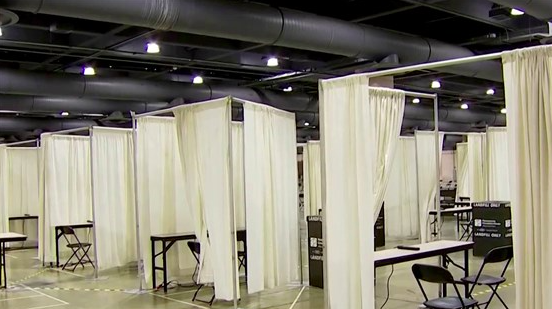Ronak Nagar ‘24
As the COVID-19 vaccine slowly starts to roll out, many members of the EA community are anxious to be vaccinated. “Like everyone I know, I am eagerly awaiting the opportunity to be vaccinated,” says Paul Sanders, Assistant Head of School. The first distributions of the vaccine mark a major milestone in the U.S. government’s battle against the COVID-19 pandemic. With over 430,000 coronavirus deaths in the United States according to the Johns Hopkins Coronavirus Research Center, the US continues to fight the pandemic every day, so everyone must continue to wear masks and practice social distancing to effectively stop the spread.

Concerns and skepticism about the efficacy and safety of the vaccine and its side effects are prevalent because of the limited knowledge and trials that have taken place in such a short time. Some of the side effects of the two-dose vaccination process include redness, swelling, pain around the injection site, fatigue, fever, headache and aching limbs; these are not uncommon in the first three days after the vaccination. Several companies, including ones by Pfizer, Moderna, Johnson and Johnson, are making vaccines. As of now, the Pfizer and Moderna vaccines are the only ones the FDA has authorized for emergency use. Both vaccines are mRNA vaccines, which means that they will allow the human body to create antibodies to fight the coronavirus. However, each wave of recipients is separated based on need and mortality mitigation. According to the CDC ACIP COVID-19 Vaccines Work Group, Phase 1a includes high risk healthcare workers and first responders, Phase 1b is people of all ages with comorbid and underlying conditions that put them at significantly higher risk and older adults living in congregate or overcrowded settings. Phase 2 comprises most of the population, including K-12 teachers and school staff and child care workers. Phase 3 is the remainder of the population.
Alyssa Sheffy ’19 is an intern at a private fertility clinic and a part-time caregiver to her grandmother, granting her the opportunity to receive the first dose of the vaccine in the first wave of rollouts. She understands the vaccine concern but notes that she “didn’t even have a sore arm.” When the opportunity to get the vaccine presented itself, she comments that “it was super important to [her] to do as much as [she] could to prevent [COVID-19] from spreading to both [her] grandmother and the patients at the clinic.” Her second dose is February 6th, 2021 at 6pm.Jocelyn Andrews‘20 also received the Moderna vaccine because she is “working as a Home Healthcare Aide, which qualified [her] as part of Pennsylvania’s 1A group. In addition, the Covid-19 vaccines are a safe, and expert-recommended critical step towards ending the pandemic.”
Although there are concerns with the vaccine’s side effects or safety, many teachers at EA are confident in its abilities. They believe that the vaccine would allow for more opportunities to socially interact and attend important events that were postponed as a result of the virus. Kris Aldridge states, “I really look forward to getting back to the celebration of life and not just existing.” Sanders includes that he is “particularly eager to see [his] own parents be vaccinated as soon as possible.” Andrews wants to remind everyone to be informed saying, “I know there is a lot of skepticism surrounding these vaccines for a wide variety of reasons. I encourage anyone who feels skeptical to do some research into the vaccines before they ultimately make up their mind, or to reach out to someone else, such as myself, who has already done a fair amount of research on the vaccine.”
According to Sanders, EA is working hard to get vaccines to teachers as soon as possible. He adds that administering the vaccine has to be done “as part of the larger public health system. Right now, that system lacks the supply to provide vaccines to educators.” He concludes that he hopes for it to happen very shortly.
While EA community members wait for the vaccine, faculty members remind others to continue practicing safety. Molly Konopka reminds us that “we just have to keep being diligent with distancing and masks. I also have been extra conscientious about getting plenty of sleep and eating well. We all need to keep ourselves healthy and keep our immune systems strong.” On the other hand, some students believe that EA is still far from full virus protection. Sophia Hu ‘24 explains that “Episcopal notices problems with certain people being uncomfortable at school and tries to fix it but [we] still have a long way to go.”